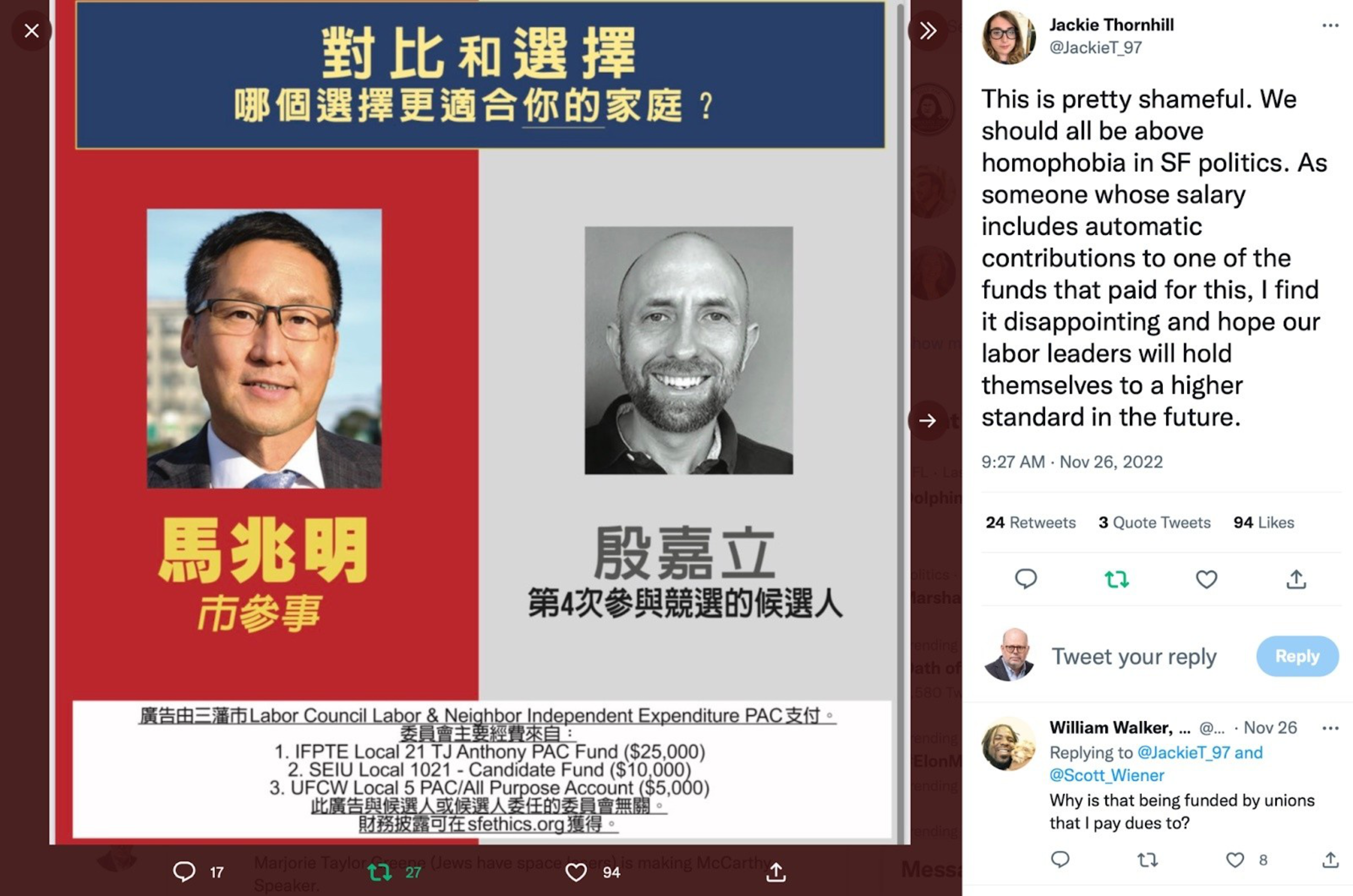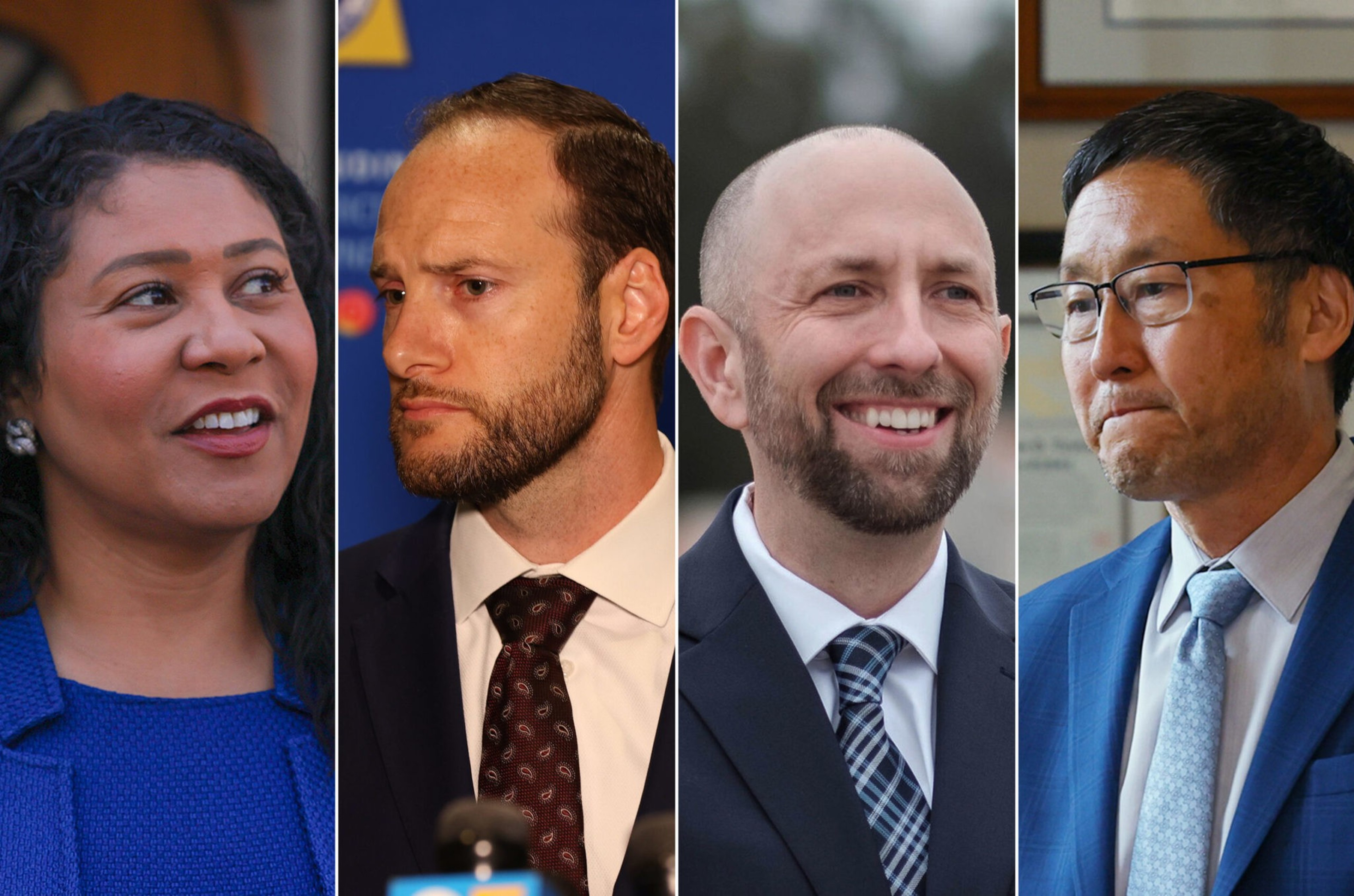Twenty-twenty-two was a turbulent year for San Francisco politics, to put it mildly.
Four elections in a row, a pandemic-battered economy, a post-Trump political reckoning and local politicians’ own idiosyncrasies all made for an eventful and exhausting year.
How did the chips fall for SF’s political movers and shakers? Let’s take a look and see how they did.
Winners: London Breed

In a year where voters had little confidence in City Hall, the mayor was able to keep her head above water longer than almost anyone else in the building.
She began the year with scandals around former Department of Public Works Director Mohammed Nuru, also facing an adversarial Board of Supervisors and district attorney. She ended it with a new, handpicked DA later approved by voters, along with new supervisors more aligned with her agenda.
She also gained a favorable national profile, joining a new generation of Black big city mayors and calling out the city’s progressives on performative “bullshit” policies on crime and homelessness.
Those issues dragged down the approval ratings of virtually all city electeds—but Breed’s, while hardly stellar, were the least bad. Given the brickbats she suffered in her rise to the office, she’s used to the sting.
Winners: Dean Preston

Ever the proud and petulant progressive populist, Preston has made himself into Breed’s chief antagonist on the Board of Supervisors—and a new leader of the progressives. But his recent political successes come from his support for what most San Franciscans regard as common sense.
Take for instance Proposition H, which passed with a stunning 70% of the vote. In a year punctuated by too many elections, how could a measure that promised to keep them to alternate years not succeed? Or, for that matter, his vacancy tax measure during an ongoing housing crisis, or his highly visible support for car-free John F. Kennedy Drive?
Preston also gained traction by becoming a point person for police and political reform, a crown normally worn by Supervisor Aaron Peskin. He seized on the “killer robot” issue and was able to marshal support for rolling back that vote.
Winners: Joel Engardio

After losing three races in a row, Joel Engardio scored in a hard-won race in District 4 and made political history in becoming the first candidate to defeat an elected incumbent supervisor.
While redistricting did give him a slight edge, Engardio maintained a diligent, upbeat campaign in the face of withering, negative campaigning and heavy spending against him.
Once sworn in, Engardio will boost the pro-Breed faction on the board, joining Catherine Stefani and Matt Dorsey. Along with Dorsey and swing voter Rafael Mandelman, he forms a caucus of out gay men—mirroring a lesbian caucus that was on the board in the late 1990s.
All four supervisors also share many of the same views on the nexus of homelessness, drug abuse and degraded street conditions—meaning those issues are likely to be top of the political agenda next year.
Winners: Parent Activists

In a year of two historic recall elections, it was activist parents that got the ball rolling on hauling unpopular politicians out of office, starting with members of the Board of Education.
Political neophytes like Autumn Looijen and Siva Raj were able to marshal outrage against an arrogant, aloof school board and help install members who pledged to get public schools back on track after prolonged closures during the pandemic.
The school board recall reverberated beyond education issues, as well: Parent activists set the stage for an even more contentious campaign against the ideologically driven former District Attorney Chesa Boudin.
Winners: Bikers and Pedestrians

With Covid lockdowns keeping people doomscrolling at home, the past few years have brought increasing awareness of the dramatic and escalating effects of climate change.
In the midst of that came Slow Streets, a pandemic-era program from the SF Municipal Transportation Agency meant to provide walkable connection routes within a transit network wound down by Covid.
Slow Streets turned into a popular respite from the pandemic routine, giving people space to teach their kids to ride bikes, walk off the day’s anxieties and reconnect with their neighbors.
Slow Streets also inspired the opening of Golden Gate Park to more pedestrian activity by expanding closure of JFK Drive to car traffic. That ignited a political war between powerful, moneyed interests where—despite a highly vexed and visible opposition—the car-free side won big.
In many ways, it was all too easy to paint the campaigns to bring back cars to JFK Drive and the Great Highway as a project of the Fine Arts Museums and their favored patron Dede Wilsey.
Wilsey—easily depicted as an out-of-touch doyenne with her Maltese lapdogs and Kandinsky paintings hung sideways in her master bath (opens in new tab)—couldn’t shake that image, even with huge goodwill donations to other campaigns, like Proposition C.
Losers: Chesa Boudin

Chesa Boudin, whose origin story embodied the radical left of 1970s America, captured the imagination of San Francisco voters who desperately wanted to make a strong statement in the face of Trumpism. So they elected Boudin, then a public defender, as district attorney in 2020.
Then came Covid. And then, fentanyl.
With rising property and hate crimes, and what seemed like a general slide toward disorder on the city’s streets, Boudin’s response struck critics as ideologically motivated and feckless.
Suddenly, a recall became inevitable. The response from Boudin and his supporters can only be described as terminally tone-deaf.
Once Boudin was recalled, the best replacement candidate his supporters could come up with was former Police Commissioner John Hamasaki, who lost his seat on the commission due to peevish behavior.
Boudin and his supporters now have a year to assess any weaknesses in Brooke Jenkins, whom Breed appointed to replace him. But unseating her may be a tall order: Voters ratified her appointment by a wide margin.
Losers: Organized Labor

By all accounts, Gordon Mar was a competent and congenial supervisor, as evidenced by bittersweet testimony offered by all his colleagues at his last board meeting on Dec. 13. In the end, his history-making defeat came from fealty to the wrong allies.
The San Francisco Labor Council, one of the city’s most influential union groups, suffered several own goals this year, the largest of which was its independent expenditure campaign on Mar’s behalf.
The Labor Council’s PAC, Labor Neighbor, spent hundreds of thousands of dollars to help Mar keep his job—easily as much as either candidate spent themselves, and almost twice what they shelled out to get Mar elected four years ago.
Much of that money was spent on material that evidently fell on deaf ears. Instead of addressing Sunset residents’ anxieties about crime and waning services, they concentrated on painting Engardio as an outsider.
One mailer aimed at Chinese-speaking voters asked them to “compare and choose: Which option is better for your family?” while framing Mar in gold on red. Needless to say, a mailer that made their candidate look like both a homophobe and a communist turned out to be a poor way to spend funds.
The Labor Council also stridently chose the wrong side on the Slow Streets debate, opposing car-free JFK in the November election.
Losers: John Elberling

As sponsor of Proposition K, the abortive “Amazon Tax” that didn’t really tax Amazon, Elberling, head of the affordable housing fiefdom Tenants and Owners Development Corporation, may well have scored the biggest own goal of the season.
The ill-conceived tax followed Elberling’s using his political juice to block an apartment building on a former Nordstrom parking lot last year, sparking a political firestorm and a state investigation. The involvement of former Supervisor Jane Kim prompted an ethics complaint over the matter, and it became a cause célèbre in Matt Haney’s successful campaign for Assembly against David Campos.
But more importantly, Elberling’s move sparked citywide outrage over barriers to building much-needed housing—and perhaps even more ironic, the project may be coming back anyway (opens in new tab). Meanwhile, the Prop. K debacle makes one wonder where all that juice went.
